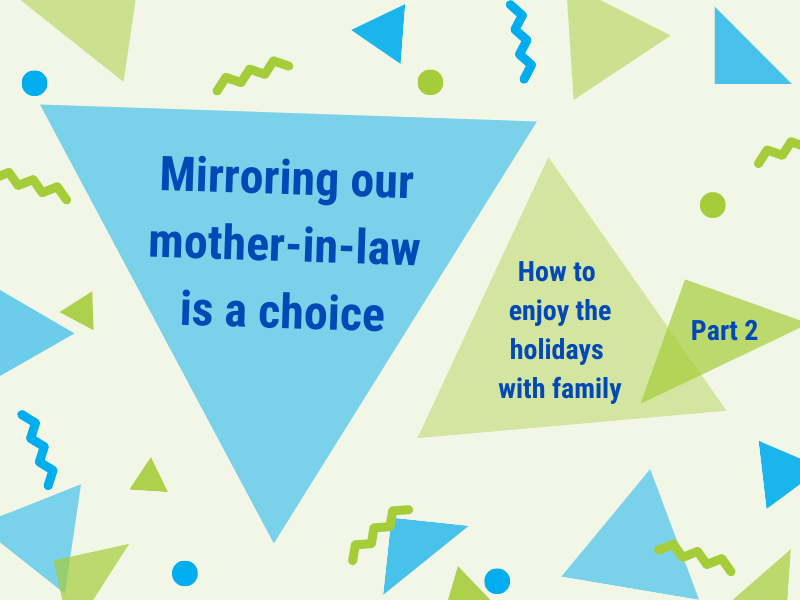The Holiday Season is a great time to improve your relationships.  Or to make them worse.
Or to make them worse. 
Traditional family gatherings can create a mixture of emotions and experiences – and not all of them are positive and feel good.
Spending more time than usually with family can be fun, it can build and strengthen feelings of love and connection.
But times of family reunions, like the Christmas season, can also include boring or uncomfortable rituals and customs – e.g., long hours of eating, drinking and talking – and strict expectations about how we should behave and contribute to the celebrations.
Old family stories, the good ones and the bad ones, can still affect the delicate network of feelings that link us with our close and also with the more distant family members.
Also, relationships between family members can change over time; they can improve, but they can also deteriorate for various reasons.
And, of course, we don’t feel loving and close to everyone just because they are somehow related to us. This might not be an issue during the year when we manage to avoid seeing the not-so-much-loved family members, but it can become a problem over the festive season when we are expected to spend time with them.
What can we do to improve our relationships with ‘difficult’ family members?
Our thoughts determine the quality of our relationships with other people. What we think about a family member influences how we feel and act when we are with them.
Thoughts like ‘He/she is so difficult’ create emotions such as stress, defensiveness, frustration, or judgment. This type of emotion leads to a certain type of behaviour. We try to avoid that person, treat them with unfriendliness, or react in a resentful way. This usually makes our relationship and our encounters with that person difficult.
Gaining awareness is always the starting point for positive change
Before we can make any change for the better, we have to become aware of the thoughts we have about the person with whom we want to get on better.
Very often, paying attention to our thinking is actually all we need to open up and develop an understanding that allows us to change our thoughts, feelings and actions. Then, automatically, the relationship will also change.
A great technique to increase our self-awareness and openness to see the other one more objectively and neutrally is to deliberately focus our attention on the fact that we have a lot in common with the other person.
This technique (source: Jody Moore) is easy to apply and really helpful when we struggle or feel stuck in our relationship with another person.
A mind-opening question: In which ways is he/she just like you?
Instead of just thinking, ‘She is difficult’, we can ask ourselves: ‘In what ways is she like me?’
And when we answer this question honestly, we can easily see: ‘Yes, she is difficult in certain areas, like I am difficult in certain areas. She is just like me!’
EXAMPLE
Imagine this little scenario:
You are preparing the Christmas dinner.
Your sister joins you in the kitchen, and very soon, you have a heated discussion with her about how to cook a certain dish. If you are arguing and feeling defensive, it’s probably because you think, ‘She is wrong, I am right. As always, she is not listening; she is not respecting my way of doing things.’
Now is the right time for you to stop and interrupt what’s going on in your mind by asking yourself, ‘ In what ways is she like me?’
It might be that there is a lot you share with your sister:
-
- She has clear ideas about food preparation – just like you.
- She has opinions about the steps to be taken, and she gets confused if other people don’t see it her way – just like you.
- She wants validation and wants to be right – just like you.
- She might be feeling disrespected – just like you.
Seeing how your sister is just like you will help you feel compassion and connected to her.
Give it a try
– when you are feeling attacked or annoyed by people, or if you are feeling judgemental of others –
take a step back and deliberately appreciate all the areas where they are just like you.
It will get you to a more compassionate place. And to better relationships.



